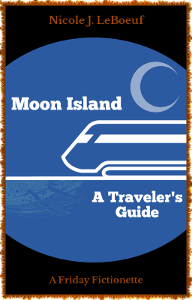this fictionette visited the invisible cities and afterward kept walking
Fri 2015-01-02 23:13:33 (in context)
- 1,277 words (if poetry, lines) long
Your Friday Fictionette for the first week of January is "Moon Island: A Traveler's Guide." For the first time in weeks I've uploaded/posted/published everything on time--the excerpt here on the actually writing blog, the excerpt at Wattpad, the accompanying public posts in my Patreon Activity Feed, everything. I'm feeling rather industrious right now. (I'm also trying not to think about how long everything took me.)
There's something of the tone of "The Ones Who Walk Away From Omelas" in this one, more obviously if you read the whole thing than if you just read the excerpt (insert blatant but brief plug for subscriptions here), but it's less to do with Le Guin's ethical thought experiment and more to do with the sense of wonder you get from the very last paragraph of her story. I was very much taken with the ethical premise and question when I first read the tale, but now what really sticks with me is the contrast between Omelas and the destination of those who walk away.
Throughout the story, the narrator coaxes you into imagining Omelas. She tries to make it easier for you wherever difficulties arise. She invites you to collaborate with her in outright inventing the place: "If an orgy would help, don't hesitate." Even the horror of the sacrificial child has a role in this task: she offers this detail as one last aid to making feasible the task of imagining happy Omelas. But what of the place toward which people who walk away from Omelas go? There the narrator simply gives up. She's in the same boat as the reader. "The place they go towards is a place even less imaginable to most of us than the city of happiness. I cannot describe it at all. It is possible that it does not exist."
Of course there's an assertion on the level of the ethical thought experiment: that humans may well be incapable of imagining a true utopia, but that won't stop us from "walking ahead into the darkness" to try to find it. But as a storyteller myself I'm fascinated with this meta-treatise on the limits of the imagination, and with the strategies we use to imagine the unimaginable. If we cannot describe it, perhaps we can describe something else, and position the indescribable in relation to it.
There's also a touch of Italo Calvino's Invisible Cities in "Moon Island." It's been years since I read the book, but the flavor of it sticks with me: fantastical, fictional places that only begin to exist when the storyteller creates them in the listener's mind. But the city in Marco Polo's mind can't be the same as the city in Kubla Khan's mind. Even if they spoke the same language, which they do not, there would be translation issues. All current forms of speech are lossy data transmission systems. And yet a city comes into being within Kubla Khan's mind. This happens regardless of whether the city physically exists in the Khan's empire or was invented out of whole cloth by his explorer correspondent. That's the magic of storytelling. It's an act of creation. And what has been created can never be wholly lost.
So Moon Island now exists in my head, and that's a happy thing but also a sad thing, because now I want to visit it, and I know I can't. At least, not outside of imagination and dreams.
Drat.
